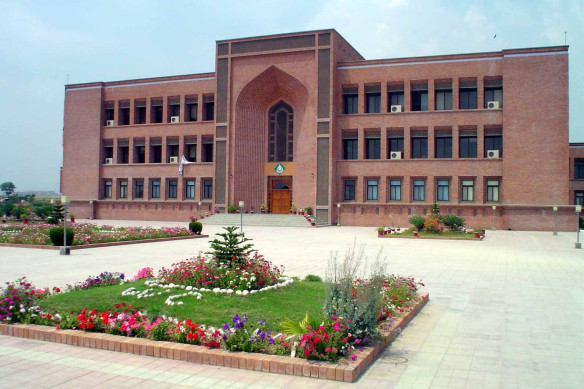Islamabad’s International Islamic University is an incubator for Deobandi and Salafi radicalisation
The IIUI was established in Islamabad in 1980, funded generously by Saudi Arabia. The Palestinian cleric – and founder of Al-Qaeda – Abdullah Azzam joined the University in November 1981 as a teacher. In more recent times, the mastermind of the attack on Parade Lane (December 2009) was also a student at the university. Patterns of latent radicalisation other than these famous examples abound. The Provost of the IIUI reportedly advised Baloch students to avoid seeking admission at the institute, while the Dean of the Basic and Applied Sciences department introduced a gender segregation policy that restricts male teachers from entering the women’s faculty premises. The chairman of the university’s Media and Communication Studies department told media personnel that efforts to “politicise” Malala Yousafzai are wrong, because she “represents a dirty picture of our society.” In January 2015, a seminar was organised at the ‘Daawa for Women’ centre to discuss the effects of black magic and how to treat its effects using religious scriptures.
Religious seminaries have usually been pointed out as a source of radicalisation in our society by researchers and lawmakers. While the deleterious effects of such seminaries cannot be dismissed, supposedly modern and elite universities also act as breeding grounds for religious fundamentalists and Islamists.
Dr Ayesha Siddiqa, in her seminal study on radicalism in elite Pakistani universities, concluded that “better educational facilities and access to ‘other’ worlds does not necessarily bridge the civilisational gap. The political ideology of the youth from affluent social backgrounds, hence, is not markedly different from the poor youth. While the possibility of these youth and women studying in top class universities physically joining jihad and waging war may be less, their underlying thinking is not very different.”
The study, titled ‘Red Hot Chilli Peppers Islam,’ touched upon retrogressive ideas prevailing in supposedly elite universities. Radicalism, especially in terms of the popular perspective of the outside world or the ‘other’ world, is part of the social pop culture reflected in the political views of youth from all socio-economic categories. Young people have a tendency to embrace radicalism or ideas which are tantamount to radicalism not necessarily because they understand the underlying ideology or comprehend the religious principles, but because such ideas have become popular in society and are not challenged by an alternative discourse.
The education sector has been neglected in Pakistan since the country’s inception. Induction of educators based on political patronage networks started during the reign of Zulfikar Bhutto (1972-77). Following in his footsteps, teachers with religious inclinations were recruited during the era of General Zia-ul-Haq (1978-1988). The rot truly set in afterwards, and Pakistan’s education system is now in a perpetual state of decay. The establishment of private institutes hasn’t helped much in this regard. In fact, supposedly secular schools, colleges and universities are being operated by religious groups. Add a historical propaganda-laden curricula and ill-trained educators and we have all the ingredients to mass-produce confused minds.
In such circumstances, events like the WIMUN incident are bound to take place. There is little hope that any worthwhile lesson will be gleaned from the incident by the administration of the IIUI or any other university for that matter. Freedom of expression and an exchange of ideas seem like distant ideals for students of our country. Until the state rejects its revisionist ideology regarding religion and history, our universities and students are bound to suffer.
Source:
http://www.newslinemagazine.com/2015/03/incubators-for-radicalisation/


Islamabad’s International Islamic University is an incubator for Deobandi and Salafi radicalisation
ymmgoxbqb http://www.gn7185vl2j5lg3dzp1r99p2x99a45y3qs.org/
aymmgoxbqb
[url=http://www.gn7185vl2j5lg3dzp1r99p2x99a45y3qs.org/]uymmgoxbqb[/url]
calvin klein 2015 9月始まり
靴 臭い 捨てる
バーマス キャリーバッグ 口コミ fx
エミリオプッチ シャツ メンズ
エルメス きらきら
dior 名前彫り
シャネル 日本限定
オークリー スクエアー
nixon 時計
コーチ 靴 返品
フェラガモ スカーフリング
ナイキ 子供服通販
ジバンシー 皿 オレイン
カシオ 心拍
フォリフォリ 時計 愛知 60hz
セイコー 30代
バリー 中古 バッグ
タイヤ 太さ 違い
The point though is that we haven’t expanded M2 at a rate significantly greater since the Fed began their large scale asset purchases than we have in prior periods as the chart below reflects:(click to enlarge)If you don’t understand how M2 grows it is easy enough to buy into the rhetoric that the pundits continue to bandy about but the idea that the Fed’s loose money policy is inflationary or that it is flooding the system with money is just not true.
michael kors uk
6, 7 contain a variable mixture of new and old wells.
michael kors wallet
has delivered a 21% growth in continued operations since 2008.
michael kors hobo handbags
Growing Conditions: The most basic price diver with any commodity is supply, and with soybeans, weather is the underlying variable that impacts production.
michael kors messenger bag